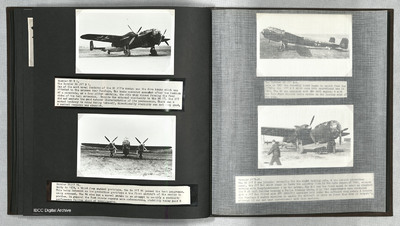Dornier DO 217 B1 and V4
Title
Dornier DO 217 B1 and V4
Description
Photo 1 is a starboard side, ground view of a DO 217 B1. It featured a dive brake on the rear fuselage which made its directional stability poor.
Photo 2 is a DO 217 V4 seen from the front. Test pilot reports indicated poor handling and performance.
Photo 2 is a DO 217 V4 seen from the front. Test pilot reports indicated poor handling and performance.
Coverage
Language
Type
Format
Two b/w photographs on an album page
Publisher
Rights
This content is available under a CC BY-NC 4.0 International license (Creative Commons Attribution-NonCommercial 4.0). It has been published ‘as is’ and may contain inaccuracies or culturally inappropriate references that do not necessarily reflect the official policy or position of the University of Lincoln or the International Bomber Command Centre. For more information, visit https://creativecommons.org/licenses/by-nc/4.0/ and https://ibccdigitalarchive.lincoln.ac.uk/omeka/legal.
Identifier
PThomasAF20060042
Transcription
[photograph]
Dornier DO B 1.
The Dornier DO 217 B 1.
One of the most novel features of the DO 217’s design was the dive brake which was attached to the extreme rear fuselage. The brake operated somewhat after the fashion of a parachute, or a four ribbed umbrella, the ribs closed forming the four sides of the tail extension. Despite the external similarity to the DO 17, the 217 did not emulate the good natured characteristics of its predecessor. There was a marked tendency to swing during take-off, directionally stability was not very good & control response was sluggish.
[Photograph]
Dornier DO217 V4.
Early in 1939, a third Jumo engined prototype, the Do 217 V4 joined the test programme. This being intended as the production prototype & the first aircraft of the series to carry armament. The V4 also had a dorsal strake in an attempt to rectify a stability problem. In general Test Pilots reports were unfavourable, stability being poor, & performance falling short of requirements.
Dornier DO B 1.
The Dornier DO 217 B 1.
One of the most novel features of the DO 217’s design was the dive brake which was attached to the extreme rear fuselage. The brake operated somewhat after the fashion of a parachute, or a four ribbed umbrella, the ribs closed forming the four sides of the tail extension. Despite the external similarity to the DO 17, the 217 did not emulate the good natured characteristics of its predecessor. There was a marked tendency to swing during take-off, directionally stability was not very good & control response was sluggish.
[Photograph]
Dornier DO217 V4.
Early in 1939, a third Jumo engined prototype, the Do 217 V4 joined the test programme. This being intended as the production prototype & the first aircraft of the series to carry armament. The V4 also had a dorsal strake in an attempt to rectify a stability problem. In general Test Pilots reports were unfavourable, stability being poor, & performance falling short of requirements.
Collection
Citation
“Dornier DO 217 B1 and V4,” IBCC Digital Archive, accessed November 8, 2024, https://ibccdigitalarchive.lincoln.ac.uk/omeka/collections/document/23177.
Item Relations
This item has no relations.

